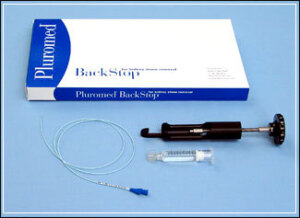Boston Scientific Buys Rights to Pluromed's Kidney Stone Gel
by
Brendon Nafziger, DOTmed News Associate Editor | October 13, 2009

BackStop forms a temporary
plug to prevent kidney
stone fragments from escaping
the ureter during treatment
Boston Scientific scooped up global distribution rights for Pluromed, Inc.'s BackStop, a gel used in kidney stone procedures, the companies announced last week. Neither company is disclosing financials of the deal.
Cleared by the FDA in June, BackStop is expected to launch in the U.S. in 2010. It has been in limited release in Europe and Canada since 2008.
"Boston scientific is clearly the market leader in urology and endourology devices. They have the expertise to deliver a useful new product to the market. And we anticipate a very successful launch," John Merhige, vice president of market development of Pluromed, tells DOTmed News.
How BackStop works
BackStop is a gel-like plug used during kidney stone treatments.
Unlike, for example, water, which is solid at low temperatures but becomes liquid when heated, BackStop is made of a polymer that is liquid when cool but becomes a viscous gel at body temperature.
During kidney-stone treatments known as ureteroscopic lithotripsies, kidney stones are broken into tiny fragments using lasers or other energy-delivering sources. However, there's a snag: while being smashed, fragments can migrate up the ureter and pass into the kidney, which could add to the length and risk of the procedure, increase the chances that all of the stone won't be removed, or even require additional interventions to fix.
This is where BackStop comes in. It is injected through a 100 cm-long catheter into the ureter above the stone. When BackStop enters the ureter, body heat causes it to form into a plug which prevents stone fragments from migrating up the ureter and into the kidney.
And after the lithotripsy is finished, surgeons dissolve the plug with a cold saline solution, letting it pass harmlessly out of the body.
Merhige says Pluromed recently conducted clinical studies comparing lithotripsies with BackStop to those without. In operations where it wasn't used, stone migration occurred in around 53 percent of all cases, whereas only about 9 percent of patients using BackStop experienced migrations -- a significant reduction of risky stone movements of almost 83 percent.
The study was accepted for publication in the journal Urology, and should appear in the April issue next year, according to Merhige.
